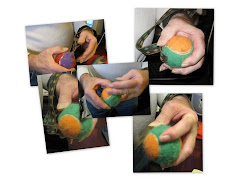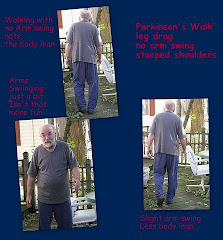Dehydration Brought on by Stress
Things have been a bit hectic around here for the last several weeks. Hectic means that Steve will be become stressed no matter how things are handled. And stress means that there is little predictability about how he will react. Here it meant that Steve was growing steadily more anxious about the impending appearance of the roofing crew. Strangers were going to be all over his roof doing work which he could no longer supervise let alone climb the ladders to monitor. To top it off family dogs were spending their parents' vacation with us.
 |
| Having a father-daughter chat |
For me the roofing job was stressful in terms of $$$$$ spent and the not-so-hot clean-up which followed but it was a relief to have the roof leak-free. It should outlast us. For Steve it was the stress of unknown people, sun-up to sunset noise, and chaos that sent him around the corner to a darker place.
We know that stress means that the PD patient will become more symptomatic. Tremors appear more frequently. If Steve is severely stressed, his entire body might shake. As soon as he calms down, that shaking will stop as abruptly as it began. But it is the psychological symptoms which really affect his physical state. When feeling stressed, one symptom is that he manifests is feeling that he has to urinate more often - not unusual - but in the case of many men, it means that he is going to lower his fluid intake to avoid accidents. His body also becomes more rigid and he walks with a tiny shuffle severely impacting his balance.
In this hot summer with fans but no central air conditioning, the sweat level has also been high. And that feeling of heat fatigue is not conducive to drinking more water to compensate but rather to begin the shut down. Dehydration looks a lot like the end stages of Parkinson's.
Although I caught the dehydration symptoms early and tried to monitor the water consumption, he pulled a water bottle bait and switch on me and it was a few days before I realized that he was showing me the older empty bottles. And then...the bottom fell out.
Let's face it, caregivers are often pushed to their limits by their charges. Whether you are a spouse, sibling or child, there comes a time when the fear and the urgency of the situation (feels as if it) forces us from gentle into harpy mode. He complains that he is dying and you find yourself in the body of a screaming bitch who is yelling, Do you want to live? Then stop trying to kill yourself. Help me help you! There is no question that the fear-factor forced him to give this some thought by the next morning and he was more open to suggestion but still quite demanding..
Even though Steve never cared about really cold drinks, ice water has helped more than anything else. It isn't a lot of ice water at one time but rather, smaller amounts frequently...we topped off everything with a few sips through the straw. (Yes, I know he doesn't like straws but they are helping) I mixed his creatine (which must be first dissolved in very warm water) with ice cold blueberry/pomegranate juice. And he now downs it promptly. We use 2 or 3 trays of ice cubes a day just on his ice water. Too much water can also be damaging to the system - more is not always better just as less is always not more.
Instead of going through weeks and weeks of a debilitating condition as he did in the winter of 2009-2010, he is coming back steadily from that horrible place. He can walk down the hall without help; although the cane is useful with four dogs around. He can get into bed on his own again. Am I going to let him select his medications and supplements from the organizer? Not for awhile yet - perhaps not again.
Eventually we will report on adult underwear and other incontinence aids we have used. Some are clearly more absorbent than others. For now, the fever is gone, the total confusion is ending, he is neither helpless nor totally rigid in the morning, unable to get out of bed. Yes, he needs encouragement to gently stretch before sitting up. At least now he can do that.
He has been miserable as he saw everything seem to vanish over night. Cognition, movement, bladder control, ability to dress, to function. He couldn't even use the TV remote a few days ago; now he's back to switching programs I am listening to in midstream. He walks down the hall easily pushing aside the rawhide dog chews and gently tapping with his care to ask a resting canine to move clear of his path. He has even become more careful with his special PD prisim lenses because he is back online and can't see the monitor without these glasses.
 |
| Topper watching roofers Willson sleeps comfortably |
Next year we may add a dehumidifier for the 2nd floor. And next week I'll lay in a better supply of drinks to compensate for electrolyte loss. We're going to add cocomut water and Gatorade to the pantry.














If a person is diagnosed with Parkinson's disease before the age of 18, it is known as juvenile Parkinson's disease. This is very rare.
ReplyDeleteOf the 10,000 people diagnosed with Parkinson's disease in the UK each year, 1 in 20 is under the age of 40.
In the US, Juvenile PD age range is 2-20. It is considered to be genetic in origin.
ReplyDeleteYoung or Early Onset PD (YOPD) is about 21-50 years of age.
So many people actually have YOPD but many of the precursor symptoms are rarely recognized.
Although we normally do not post comments with backlinks, we think yours is very useful.
Thank you for your comments.
My mother is now 73 years old. About 10 years ago, she was diagnosed with Parkinson's disease. She is having stiffness and finding it difficult to walk. She tends to fall. Now, another problem that we are facing is that she is losing her memory day by day.
ReplyDeleteIt is time to have a discussion with her doctor, if you have permission. It may be time for a medication adjustment or timing adjustment in meds. Parkinson's is a progressive disease and when symptom changes occur, other things must change as well.
ReplyDeleteIf her falls are due to stiffness, then medication, exercise and medical massage might help. If she has postural instability, I don't really know what to tell you except that aquatherapy can help improve balance. We have written about it. At a certain point, Steve refused to go in the pool at the therapy center and that was the beginning of his worsening issue with postural instability.
We'll be writing about supplements to help cognition soon.
The medication being used by some people with memory and other cognition issues are Aricept and Namenda. Although associated with Alzheimer's disease, they have been found effective by some PwPs.